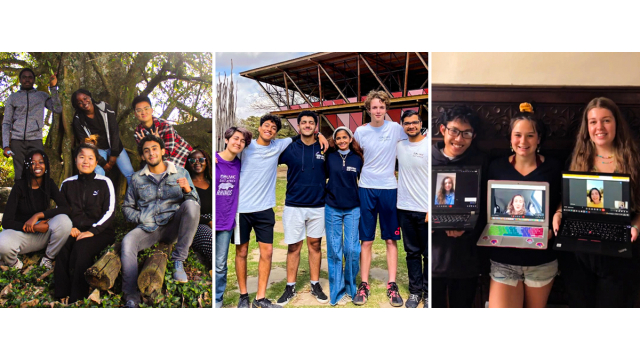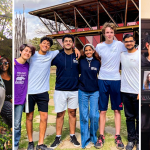The selection process for this year’s Young Aurora pre-selection panel was not an easy one, with 15 project proposals submitted from across almost all UWC schools and the African Leadership Academy, all with important humanitarian issues to solve and creative ways of doing so.
As pre-selection panel member Vahid Monadjem, founder of a social-impact driven software company, Nomanini, stated, “This was my first and hopefully, not my last year as a member of the judging panel for Young Aurora. I was impressed by the unifying focus on improving the world, which was approached in such diverse ways. Judging was made difficult by the high standard of the submissions. They show dedication, practicality and a degree of self-reflection that makes me very optimistic about the future, despite the challenges humanity faces.”
The projects ranged from providing support to LGBTQIA+ students in Hong Kong’s local schools to bringing together young people from Japan and Korea to discuss the complexities of their countries’ histories, from providing solutions to help the unhoused community of Metulia, Canada, to providing educational support to the students from Artsakh (Nagorno-Karabakh). All projects were assessed according to six key criteria: creativity, sustainability, quality of research, impact potential, commitment and self-reflection. You can find out more about the three finalist projects below.
The eligibility requirements of Young Aurora state that each team has to identify a humanitarian issue affecting a community in their school’s vicinity. But thanks to the global spread of UWC schools and the African Leadership Academy, the collective humanitarian impact of all 15 projects spans far and wide across four continents and numerous countries and communities. All 15 teams, whether they made it to the final or not, received detailed feedback from the pre-selection panel to help them further develop their projects and bring them to fruition. The three finalist teams will now integrate this feedback into their final project proposals and project presentations, which they will share with the jury in October for a chance to win a $4,000 project grant.
In this fifth year of Young Aurora, it was as inspiring as ever to see the humanitarian spirit of each of the students involved shine through so clearly. The project provides the students with an opportunity to put their drive for change into action and address concrete humanitarian issues with innovative and sustainable solutions.
As Marta Lucía Kupfer, Learning and Development Specialist at Teach For All and member of the 2021 pre-selection panel, put it: “Young Aurora puts the power in the hands of young people, which is where more of it should be!”
The Three Finalist Teams:
UWC Atlantic – Peer Listener Project
This project is focused on the mental health crisis among young people. The team aims to build a peer-listening network at neighboring schools based on a model that has been tried and tested at UWC Atlantic for 11 years, whereby students are trained and empowered to listen and help other students with their mental health issues. By bringing this same model to more schools in the region, the students hope to tackle the growing number of mental health issues among young people in their local school area.
Speaking about her belief in the project, team member Ellamay from Wales said: “I believe in this project because I have seen first-hand the positive impact Peer Listeners can have on individuals and a community. I have seen the benefits of students feeling comfortable in approaching a peer about their struggles, and of Peer Listeners being equipped to recognize those who need support. I have also seen how when there are students actively providing support for mental health, the culture of talking about it in everyday conversations is more common, and the topic is altogether less taboo within the community. Having previously attended local schools in Wales, where the mental health of myself and my peers was not prioritized despite its declining state, I know of the dire need for a system of continuous recognition and support, and I believe that integrating peer listeners into local classrooms is the answer.”
Waterford Kamhlaba UWCSA – Seed of Hope
This team aims to empower young people at Malindza Refugee Camp by creating a youth hub for them that serves both as an online education center and social space. Given the added challenges that young people in this refugee camp have faced over the past year and a half, the students hope to help alleviate the educational and mental health consequences of this period.
When reflecting on his work on the project so far, Seed of Hope team member Prince (who grew up in the DRC before moving to Zimbabwe as a refugee in 2017) noted: “This project shows that young people do not only have big fictional dreams of making positive changes happen, but that we also challenge the traditional way of doing things by stepping out with more realistic and clear ways of changing the world. Working on this project has been a rare eye-opening opportunity for me to become more aware of my strengths and weaknesses. It also emphasized what my purpose is and what gives meaning to my life. And it has drastically shifted how I see the complexity of the humanitarian cause we seek to address.”
UWC East Africa – The Lorax Project
The Lorax Project aims to tackle soil erosion and deforestation through the distribution of “seed bombs” with the help of local school students in Arusha, Tanzania. The “bombs” are marble-sized balls that contain seeds, soil and clay and are made at UWC East Africa as a CAS activity. The “bombs” will then be distributed both by UWC East Africa students and students from other local schools to help trees grow in the area. The team also plans to equip the local schools involved with a rainwater collecting system providing them with clean drinking water, which they can also use to water the trees they have planted in the dry season.
Team member Amitis from Iran spoke of his passion for the project: “Soil erosion is a huge problem in Tanzania and East Africa in general, but unfortunately, not many countries are trying to tackle it. Kenya, however, has been fighting against it with the help of “seed bombs”. Looking at their success rate, I believe that we have chosen the right method. In addition to that, by including local school children in the project and providing them with not only the “seed bombs” and the knowledge to take care of them, but also a rainwater collecting system, we will have a significant effect on their lives. This project will help hundreds of children have access to clean water, fruit trees and a safer school environment. I understand that our project is not going to solve the problem in the whole of Tanzania, but I believe that it is a big step in the right direction and can one day grow into something as big as Seedballs Kenya. This project has helped me learn that if one is determined to have a positive impact, you can always find support, and it has shown me that by reaching out and finding partners, we can make anything happen.”









